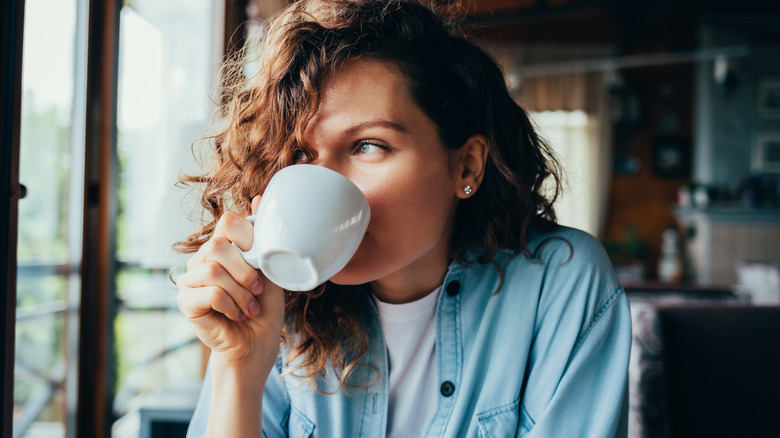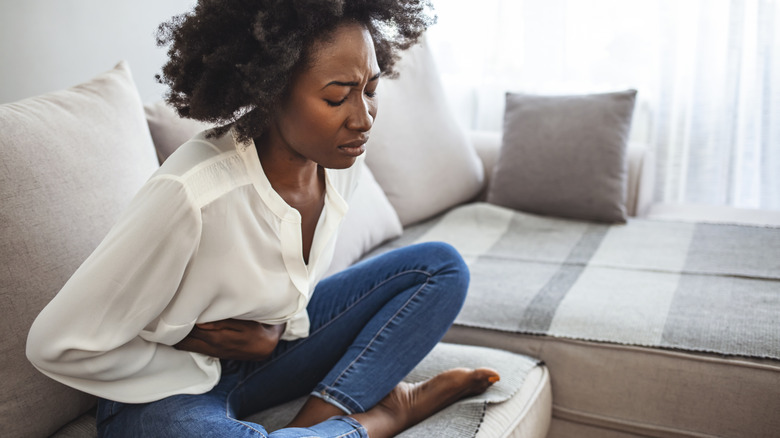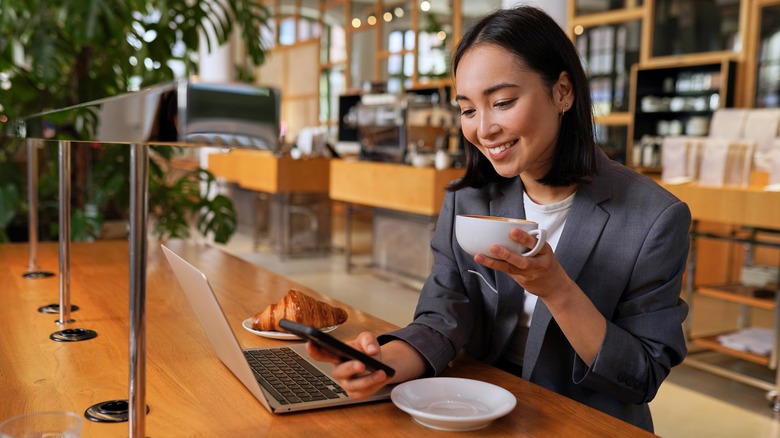Why You Should Think Twice Before Downing A Coffee Quickly
Coffee's fanbase is so loyal, it could almost — almost! — rival Taylor Swift's faithful Swifties. A whopping 2 billion cups of coffee are consumed daily, reports the British Coffee Association, making it the most popular drink around the world besides water. The brewed beverage contains a delicious kick of caffeine and is many people's drink of choice to pull an all-nighter or power through a long workday.
Besides increasing energy, coffee offers several other proven benefits, including improved mood, better athletic performance, and protection against certain health conditions like Type 2 diabetes and heart disease (per Healthline). It's also loaded with healthy antioxidants that are known to fight inflammation and regulate metabolism.
But as great as your morning joe may be, it can have some not-so-great side effects, especially when it's chugged on your way out the door. Here's why slow and steady is the way to go when getting your caffeine fix.
If coffee makes you feel sick, you might be drinking it too fast
If you need a quick boost of energy, you might decide to gulp down a cup of black coffee or a triple-espresso latte. But devouring these drinks in a short amount of time can be a bad idea, as coffee brand Black Insomnia explains on its website: "Drinking a cup of coffee slowly lets your body take its time processing the caffeine. You'll feel your energy level slowly ramping up — gently. Meanwhile, your body will be slowly clearing it out of your system. Naturally, this results in less of an initial jolt, but it also reduces any potential crash later on."
Drinking slowly also means you'll have more time to notice the effects of caffeine so you can cut yourself off before you've gone too far. According to Healthline, overconsuming caffeine can lead to shakiness, a racing heart, and anxiousness.
Sipping your brew can also be better for your digestive system. "By holding your beverage in your mouth for a little longer before swallowing — i.e. by taking small sips — your saliva has more time to come into contact with the liquid, which can be beneficial from a gastrointestinal standpoint," Maddie Pasquariello, a dietitian, shared with Well+Good. She added that gulping coffee may also lead to swallowing air, which can cause symptoms like "bloating, gas, nausea, burping, or pain."
How to enjoy your coffee without icky aftereffects
If you want to drink coffee regularly but don't want the jitters or an upset stomach afterward, learning to slow down is the best place to start. "I'd say you'll probably experience the best balance of minimizing side effects while ensuring the cup still tastes good by drinking it within about 15 to 30 minutes," Maddie Pasquariello told Well+Good.
Even if you're in a rush, it's also a smart idea to set aside time to eat before knocking back a cuppa. "The best way to avoid caffeine-induced nausea is to eat something before drinking coffee, or at least with your coffee," dietitian Diana Gariglio-Clelland explained to Bustle. "A piece of toast will even do the trick, but protein foods like yogurt, eggs, and cheese can help slow digestion a little bit, which can improve nausea."
Additionally, keep an eye on how many caffeinated beverages you're consuming. Though rare, drinking too much caffeine in a short window of time can be fatal, as it was for one teen who died after having three caffeinated drinks in two hours (per BBC News). Sipping slowly and alternating between coffee and water can help keep you energized without potentially dangerous consequences.


